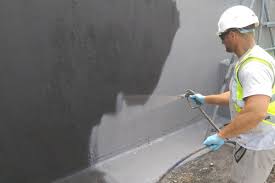Home Improvement
Waterproof Cement Explained: Uses, Benefits, and Applications

Waterproof cement is a game-changer in the construction industry, and if you’re planning a building project, you’ll want to know all about it. Let’s understand what waterproof cement is, its various uses, the benefits it offers, and the applications where it shines the most. Whether you’re a homeowner or a professional contractor, understanding waterproof cement can help you make smarter decisions for your next project.
Table of Contents
What is Waterproof Cement?
Waterproof cement, as the name suggests, is a type of cement that prevents water from penetrating through surfaces. It’s formulated by adding water-repellent chemicals to traditional cement, resulting in a mixture that offers superior water resistance. This makes it ideal for structures exposed to moisture, ensuring durability and longevity.
Uses of Waterproof Cement
Waterproof cement can be used in various applications, making it incredibly versatile. Here are some common uses:
– Foundations and Basements:
Prevents water seepage, protecting the structural integrity of the building.
– Swimming Pools and Water Tanks:
Ensures no water leakage, maintaining the efficiency and safety of these structures.
– Roofs and Terraces:
Protects against rainwater penetration, reducing the risk of leaks and dampness.
– Bathrooms and Kitchens:
Keeps moisture at bay, preventing mold and mildew growth.
Benefits of Using Waterproof Cement
Using waterproof cement in your construction projects brings several benefits. Here’s why you should consider it:
1. Enhanced Durability
Waterproof cement provides a strong barrier against moisture, which is one of the main causes of structural damage. By preventing water infiltration, it helps maintain the strength and stability of the structure over time. If you’re considering using waterproof cement, it’s also worth looking into professional waterproofing services.
2. Mold and Mildew Prevention
Areas prone to dampness, like basements and bathrooms, can quickly become breeding grounds for mold and mildew. Waterproof cement helps keep these issues at bay, ensuring a healthier living environment.
3. Cost-Effective
While waterproof cement might have a higher upfront cost compared to regular cement, it saves money in the long run. It reduces the need for frequent repairs and maintenance due to water damage, making it a cost-effective solution.
4. Increased Property Value
Using high-quality materials like waterproof cement can increase the value of your property. Potential buyers will appreciate the durability and low maintenance aspects, making your property more attractive in the real estate market.
Applications of Waterproof Cement
Now that we’ve covered the uses and benefits let’s look at specific applications where waterproof cement excels:
1. Residential Buildings
Waterproof cement is perfect for residential buildings, especially in areas like foundations, basements, and roofs. It ensures that these critical parts of the home are protected from water damage, providing peace of mind for homeowners.
2. Commercial Buildings
In commercial spaces, waterproof cement is essential for areas like parking garages, water storage facilities, and restrooms. It ensures that these high-traffic and high-moisture areas remain in good condition.
3. Infrastructure Projects
For large-scale infrastructure projects like bridges, tunnels, and dams, waterproof cement is invaluable. It provides the necessary protection against water, which is crucial for the longevity and safety of these structures.
4. Marine and Coastal Structures
Marine structures, such as piers, docks, and seawalls, face constant exposure to water and salt. Waterproof cement is specifically designed to withstand these harsh conditions, ensuring the structures remain intact and functional.
Conclusion
Waterproof cement is a smart investment for any construction project. Its ability to resist water penetration, combined with its numerous benefits and versatile applications, makes it an essential material for modern building needs. Whether you’re working on a small residential project or a large infrastructure development, incorporating waterproof cement can provide long-lasting durability and peace of mind. Don’t forget to explore waterproofing services to ensure you get the best results from your waterproof cement application.

-

 Health6 years ago
Health6 years agoAdvantages and Disadvantages of Milk
-

 Tech4 years ago
Tech4 years ago6 Tips to Improving E-Commerce Websites
-

 Home6 years ago
Home6 years agoAdvantages and Disadvantages of Village Life in Points
-

 Travel5 years ago
Travel5 years agoAdvantages and Disadvantage of Travelling
-

 Sports4 years ago
Sports4 years agoThe benefits of playing an online live casino
-

 Tech6 years ago
Tech6 years ago10+ Advantages and Disadvantages of Mobile Phones in Points
-

 Tech5 years ago
Tech5 years agoEssay on Advantages and Disadvantages of Offline Shopping
-

 Tech5 years ago
Tech5 years ago8+ Advantages and Disadvantages of Motorcycle |Having Bike